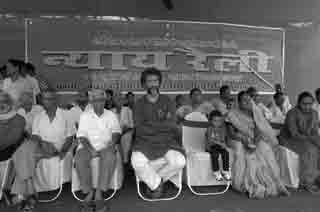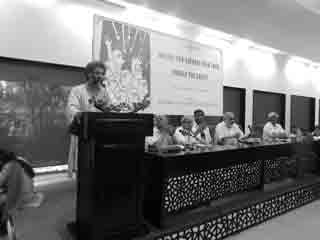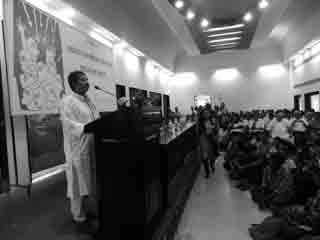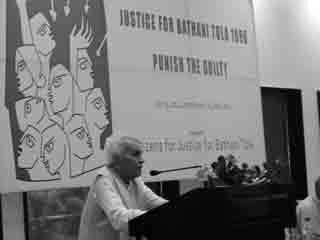COVER FEATURE
Fresh Relevance and Urgency of the
Struggle for Justice for Bathani Tola
16 years after the Bathani Tola massacre, the struggle for justice for Bathani Tola, far from being forgotten, has reemerged with fresh relevance and urgency in a new phase. Bathani Tola has once again emerged as a rallying cry against injustice, not only in Bihar, but all over the country. In the dalit movement too, Bathani Tola is, this time around, triggering a questioning about the role and silence of the ‘official’ dalit and social justice parties, and a renewed alertness about the politics involved in feudal massacres.
In this feature, you can read reports of the CPI(ML)’s Nyay Rally at Ara on the anniversary of the Bathani massacre, the Convention in Delhi organized by the Citizens for Justice for Bathani Tola, and an article revisiting the phenomenon of the Ranveer Sena. 
Rally for Justice in Ara
A massive ‘Nyay Rally’ was held at Ramna Maidan, Ara (Bihar) on 11 July 2012, the anniversary of Bathani Tola massacre. This was attended by thousands of people from all over Bihar. The rally was a culmination of month-long Nyay Yatra organised throughout the state to demand justice for Bathani Tola.
Comrade Dipankar Bhattacharya, General Secretary of CPI(ML) said, while addressing the rally that when 21 people were brutally massacred sixteen years ago in Bathani Tola to silence the rising voices of asserting poor and toiling people of Bihar, the determination to fight for the democracy and justice became stronger and more resolute.
He said that while the Laloo regime was responsible for the massacre, now it is Nitish Govt. which has perpetrated a judicial massacre with those victims. The government which attained power with promises for dalits, minorities, backwards, first bailed out Ranvir Sena Chief who was responsible for dozens of mass massacres and then maneuvered the acquittal of all the accused of Bathani Tola massacre.
Comrade Dipankar further added that people of Bihar are aware of Laloo Yadav’s nexus with the feudal forces at the when a series of massacres were organised, and today people are witness to the Nitish regime’s manoeuvrings with the same forces. Ruling party MLAs are involved in Bhayyaram Yadav and Chhotu Kushwaha’s murders. When people were protesting Chhotu Kushwaha’s killing on 2 May, police brutally targeted them, did not spare women and children. The Superintendent of Police beat up popular CPI(ML) leader and former MLA Rajaram Singh with his own hands, but the same government remained silent when arson and vandalism was going on in Patna on 2 June at the funeral procession of Ranvir Sena chief.
He said it will never be possible to make another Gujarat in Bihar, thanks to the resolute determination and spirit of the people of Bihar. Be it the freedom struggle or the anti-feudal peasant struggle, Bhojpur was the land of heroes like Vir Kunwar Singh, Jagdish Mahto and Ram Naresh Ram. And it was that fighting spirit that would prevail.
The district secretary of AIALA, Com. Siddhanath Ram, presided over the rally, which was conducted by AIALA General Secretary Dhirendra Jha. A message from Comrade Rajaram Singh, incarcerated in Aurangabad jail, was read out. RJD supporter Laldev Yadav, also incarcerated with Comrade Rajaram during the agitation against Chhotu Kushwaha’s murder, sent a message to the rally, saying that he had been arrested when he attended the mass meeting under CPI(ML)’s banner when his own party’s supporters had deserted the agitation. He said that the fighting spirit of the jailed comrades was very high, and aspired for the warmth and support of the rallyists at Ara.
The rally was addressed by Comrade Sudama Prasad, Chhotu Mukhiya’s father-in-law Umesh Kushwaha, Bhaiyyaram Yadav’s wife Usha Yadav, Bathani massacre survivor Nayeemuddin Ansari, Nayyar Fatmi who spoke of the Forbesganj firing, and Kanchan Bala who is associated with the 1974 movement and citizens’ struggles, Saroj Choubey of AIPWA, CPI(ML) CCMs Rameshwar Prasad and KD Yadav.
CPI(ML) PBMs Swadesh Bhattacharya, Ramjatan Sharma, Amar, Ramji Rai, CCMs Brij Bihari Pandey, Kavita Krishnan, Rajaram, and Bihar State Secretary Kunal were also present at the rally. q
Citizens’ Convention for Bathani Tola
The Citizens for Bathani Tola held a Convention at Speaker’s Hall, Constitution Club in the national capital on 15 July, demanding ‘Justice for Bathani Tola 1996 – Punish the Guilty’.
The Convention began with a short documentary on the Bathani Tola survivor’s struggle for justice by young filmmakers Kundan and Suman was screened, which transported the viewers to Bathani Tola and brought them face to face with the survivors’ anguish and determination to fight. This was followed by a moving rendering of a Bhojpuri song – ‘Kahe goliya chalavle’ (Why do you shoot us, oppressive soldier?) by Chintu Kumari.
 The Convention was addressed by Bathani Tola massacre survivors Sri Kishun Choudhury and Naeemuddin Ansari, who also bore witness during the trial. Nayeemuddin Ansari said Bathani Tola was targeted for daring to fight feudal forces and support revolutionary forces. He asked why it was that a CBI enquiry was ordered promptly into Brahmeshwar’s killing – yet the same Brahmeshwar who led the Bathani massacre was never brought to trial. ‘My 3-month-old daughter was flung in the air like a ball and cut with a sword – yet the High Court let the killers go,’ he said. ‘The Court says we couldn’t have hidden and witnessed the killings. But that’s what happened – we men went and hid, thinking it was us the mob wanted to kill. We never dreamt they would kill the women and children.’
The Convention was addressed by Bathani Tola massacre survivors Sri Kishun Choudhury and Naeemuddin Ansari, who also bore witness during the trial. Nayeemuddin Ansari said Bathani Tola was targeted for daring to fight feudal forces and support revolutionary forces. He asked why it was that a CBI enquiry was ordered promptly into Brahmeshwar’s killing – yet the same Brahmeshwar who led the Bathani massacre was never brought to trial. ‘My 3-month-old daughter was flung in the air like a ball and cut with a sword – yet the High Court let the killers go,’ he said. ‘The Court says we couldn’t have hidden and witnessed the killings. But that’s what happened – we men went and hid, thinking it was us the mob wanted to kill. We never dreamt they would kill the women and children.’
Shivprakash Ranjan, and Shabbir, residents of Ambedkar Kalyan Hostel at Katira, which is near Ara’s Veer Kunwar Singh University, recounted the attack on their hostel by Brahmeshwar’s supporters following his killing. The hostel and belongings like cycles were set on fire, students were beaten, slogans like ‘AK-47 Zindabad’, ‘AK-56 Zindabad,’ ‘A 100 lives to avenge the death of one’ and ‘Ranveer Sena Zindabad’ raised. They spoke of their ongoing struggle for justice and compensation, that they were conducting with AISA’s help.
They described how dalit students continue to face intimidation. On 12 July some drunken youths came and uttered threats at the hostel. The same evening, when the head of the State SC/ST Commission came to visit the hostel, accompanied by the same JD(U) youth and student wing leaders involved in the attacks, he faced the rage of the students. The students vented their anger at the Government’s inaction, protection of perpetrators, and hypocrisy by blackening the face of the SC/ST Commission chief, and garlanding him with the same burnt chappals and shoes that continue to lie strewn around the hostel. The students have a string of cases against them, while the assailants are yet to face any charges!
Prof. Tulsi Ram spoke of the casteist tenets of criminal justice in the Manusmriti, and said that the same approach continues to persist even in modern times.
Prof. Kamal Chenoy of JNU reminded that Bathani Tola was not just a caste massacre – it was a massacre that sought to punish supporters of the CPI(ML) Liberation.
Prof. Nandini Sundar pointed out that Ranveer Sena and Salwa Judum are examples of a “public private partnership”, wherein governments and private militias conveniently collude with each other. The “public” governments wash their hands off responsibility, claiming that “private” bodies do the massacres, while the private militias continue killing people in the confidence that governments will never take any action on them. She also pointed out that the Bathani Tola massacre is essentially political elimination of those who pose a political and ideological opposition to feudal forces.
Justice Rajinder Sachar recalled his visits to Bihar to investigate the Arwal massacre and massacres by feudal armies, and promised PUCL’s help in the legal struggle for justice from the Supreme Court.
Atrocities on Dalits on the Rise in Nitish’s Bihar
Data released by the National Crime Records Bureau recently, also indicate that crimes against dalits have risen in Nitish’s rule while justice has gone further out of reach. NCRB’s data shows that Bihar witnessed the highest number of caste-based crimes in the country in 2011. With 3,024 cases under SC/ST Act, Bihar accounted for 26.7% of total such crimes in the country, leaving behind even states like UP, Rajasthan, and Andhra Pradesh, which are notorious for crimes against dalits.
Not only are atrocities against dalits on the rise in Bihar, Bihar’s rate of charge-sheeting cases and conviction are also the worst in the country. Bihar’s rate of charge-sheeting cases under the Atrocities Act stands at 82.2%, below the national average of 90.7%. All other states known for caste violence have scored better than Bihar with MP and Rajasthan scoring over 99%. Bihar also has the lowest rate of conviction under the Atrocities Act: a mere 10.6% (far below the national average of 31.9%).It is impossible to deny the correlation between the rising strength of the BJP in Bihar, and the pro-feudal character of the JD(U)-BJP Government, and the rise in crimes against dalits in Bihar. |
Activist Vineet Tiwary presented a fact-finding report on the Amausi massacre of Bihar; pointing out that in the Amausi case, 10 mahadalits had been sentenced to death on very flimsy grounds. Very different standards of justice prevail depending on whether the accused belong to the upper caste Ranveer Sena or to the poorest mahadalit community. Comrade Simpson, an activist from Tamil Nadu’s Odukapattor Viduthalai Munnani, spoke about the Paramakudi massacre of dalits in police firing last year. His own brother Panneerselvan (age 45) was killed in the firing. He spoke of the caste bias of the Jayalalithaa government towards dalits, and the difficulties in ensuring punishment for the police personnel who indulged in the massacre of dalits who had gathered to commemorate the martyrdom of dalit icon Immanuel Sekaran.
Tarique Anwar from Darbhanga, whose brother Nadeem Akhtar is being victimized on false charges of terrorism also addressed the Convention. He voiced his protest against the injustice meted out by Central agencies, Central Government, as well as the Bihar Government’s refusal to protect the rights of migrant Muslim youth.
Vikas from Ramgarh in UP recounted the struggle against grab of dalit land and assault on dalits in his village.
Comrade Rameshwar Prasad, CC member of CPI(ML), spoke of the context in which the Bathani massacre took place – soon after he and Comrade Ram Naresh Ram were elected as MLAs from Sandesh and Sahar in 1995. pointed out how at every stage the poorest and socially oppressed sections had to fight. the bathani killings were retribution by a private militia unable to take in the electoral assertion of the poorest people who were engaged in the struggle for land and dignity.
Summing up the discussion, historian Uma Chakravarti who chaired the first session, recalled the demand for a ‘uniform civil code’ – and observed that the country was yet to have even a uniform criminal code, since different norms for different classes and castes of people. She contrasted the ‘AK-47s’ that figured in the feudal slogans with the cycles that were burnt by them: saying that cycles were the symbols of the quest for mobility and education of poor dalit youth. She stressed the need to confront the State – including the judiciary – on the question of justice. Commenting on Nitish Kumar’s claims of opposing Narendra Modi, she said he would do better to address the question of his own alliance with Bihar’s Modi (Sushil Modi, deputy CM from the BJP), and leave the job of fighting Narendra Modi to the committed anti-communal voices. 
The second session began with a poem by people’s poet Vidrohi. Speakers in this session included senior journalist Anil Chamaria and Chittaranjan Singh of PUCL, as well as leaders of AILC; this session was chaired by Prof. Manager Pandey.
Addressing the Convention, Lal Nishan Party (Leninist) Secretary Bhimrao Bansode from Maharashtra spoke of about the Khairlanji massacre and other similar massacres across the country, in which the struggle for justice continued in spite of the fact that courts, as a rule, meted out injustice.
Mangat Ram Pasla, Secretary, CPM Punjab, expressed solidarity with the struggle of Bathani survivors for justice. Castigating the Nitish Government for promoting injustice and patronizing feudal forces, he called for a struggle to ensure that perpetrators of all the Ranveer Sena massacres were brought to book.
Dipankar Bhattacharya, General Secretary, CPI(ML) Liberation, said that the Bathani Tola massacre was perpetrated by the Ranveer Sena and patronized by the Laloo regime as well as the BJP, in order to wipe out the CPI(ML). Instead, the result has been quite different. The Ranveer Sena did not survive, and Bathani-I (the massacre in 1996) spelt the beginning of the end of the Laloo regime, and now, in 2012, the judicial massacre (Bathani-II) is spelling the beginning of the end of Nitish’s rule.
The Convention was also attended by Satya Sivaraman, columnist Praful Bidwai, and journalist Rahul Pandita, poet Manglesh Dabral, writer Rajni Tilak, academicians Nivedita Menon, G Ajay, Tripta Wahi, Anuradha Chenoy, Sanghmitra Mishra, Ashok Chowdhury and Roma of National Forest Workers’ Union, Kiran Shaheen, Rahul Pandita and several other concerned citizens, as well as students and teachers from various universities in Delhi. A poster and a badge dedicated to justice for Bathani Tola were designed by artist Ashok Bhowmick for the campaign. 
The Convention was a timely one: the very next day, the Supreme Court was to hear the appeals filed against the HC verdict. The hearing the next day was attended by Justice Sachar of the PUCL. The Bathani survivors were represented by senior advocate P S Narasimha. The Supreme Court Bench of Justice Altamas Kabir and Justice Chalameswar admitted the appeal, asked for notices of the same to be served to the acquitted accused “as quickly as possible,” and for “original (Trial Court) records (to) be requisitioned and steps should be taken to obtain the same, as early as possible, in view of the facts of the case.”
Resolutions passed by Convention for Justice for Bathani Tola
The Convention demanded justice for the victims of Bathani Tola and other massacres committed by Ranveer Sena between 1996-2002, and punishment for all the guilty. Holding that it is the judiciary that must prove its impartiality before the people, the Convention asked that the Supreme Court should order reinvestigation of the Bathani Tola and other massacre cases if necessary, and if not, it should give credence to eyewitness accounts and punish the guilty. The Convention also demanded prosecution of the police for sabotaging evidence, failure to collect evidence against the accused, and for deposing in favour of the accused in the Bathani Tola case. It also demanded full protection including the means for self-defence to the witnesses in the Bathani Tola, Bathe and other massacre cases of Bihar.
The Convention demanded prosecution of those responsible for the attack on dalit hostels at Ara; compensation for the students; and withdrawal of the cases slapped on the students of the dalit hostels.
It also demanded reinvestigation of the Amausi massacre case and punishment for the real culprits, and a national tribunal to investigate and monitor cases of arrests of Muslim youth in terror-related cases. It demanded prosecution of those police personnel guilty of the Paramakudi firing, and punishment for the perpetrators of the attack on dalits at Ramgarh in Greater Noida, and demolition of the illegal wall surrounding dalits’ panchayat land in Ramgarh.
The Convention supported the campaign for justice in Bihar and demands CBI enquiry into the Forbesganj firing, murders of Bhaiyyaram Yadav, and Chhotu Kushwaha. q

 The Convention was addressed by Bathani Tola massacre survivors Sri Kishun Choudhury and Naeemuddin Ansari, who also bore witness during the trial. Nayeemuddin Ansari said Bathani Tola was targeted for daring to fight feudal forces and support revolutionary forces. He asked why it was that a CBI enquiry was ordered promptly into Brahmeshwar’s killing – yet the same Brahmeshwar who led the Bathani massacre was never brought to trial. ‘My 3-month-old daughter was flung in the air like a ball and cut with a sword – yet the High Court let the killers go,’ he said. ‘The Court says we couldn’t have hidden and witnessed the killings. But that’s what happened – we men went and hid, thinking it was us the mob wanted to kill. We never dreamt they would kill the women and children.’
The Convention was addressed by Bathani Tola massacre survivors Sri Kishun Choudhury and Naeemuddin Ansari, who also bore witness during the trial. Nayeemuddin Ansari said Bathani Tola was targeted for daring to fight feudal forces and support revolutionary forces. He asked why it was that a CBI enquiry was ordered promptly into Brahmeshwar’s killing – yet the same Brahmeshwar who led the Bathani massacre was never brought to trial. ‘My 3-month-old daughter was flung in the air like a ball and cut with a sword – yet the High Court let the killers go,’ he said. ‘The Court says we couldn’t have hidden and witnessed the killings. But that’s what happened – we men went and hid, thinking it was us the mob wanted to kill. We never dreamt they would kill the women and children.’ 
